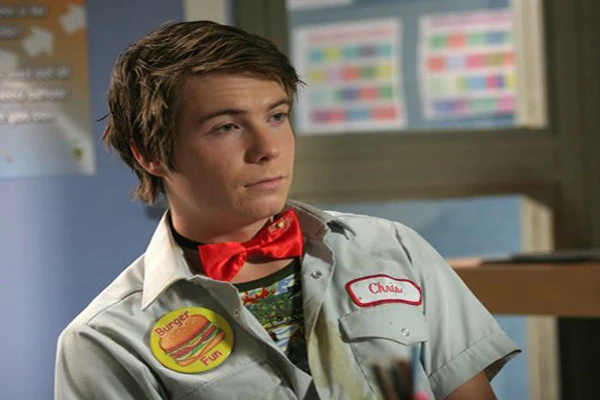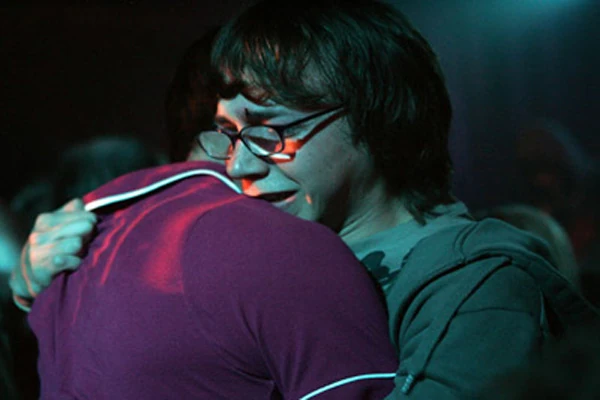Skins: Season Three, "Everyone" and "Cook"
Series Three, Episode One, “Everyone”
The ability of reinvention is Skins’ greatest gift. Things that may have felt fresh in the first
season began to feel uninspired in the second season. The show’s greatest
ability to reinvent comes in the series's decision to scrap its entire cast after
two seasons. As much as I might miss some of the first generation’s characters,
I was hesitantly excited about what a fresh start might look like, especially
if the show were to take full advantage of the conceit.
The first time I watched the premiere of the third season, I
was looking for parallels between the two generations. Part of me suspected
that Skins would simply do variations
on the same stories. While to a degree, the show does tend to lean on certain
types of stories, it doesn’t fall back on familiar characters. There are
comparable character traits here, but not so much so that it feels like these are
straight carbon copies of the characters who came before.
Effy and Pandora’s relationship has shades of Tony and Sid,
but it’s a healthier relationship. Pandora is a very different person from Sid
(a happy-go-lucky, wide-eyed goofball), and Effy feels protective of her (as opposed to being intentionally manipulative). Effy
may be a mischievous savant, but she’s more transparent than Tony ever was. She
also recognizes good, put-upon people and sympathizes with them (i.e. Pandora,
Emily). The love triangle is in place, but it’s a more earnest take on the
trope. Effy has feelings for both Freddy and Cook. But she’s also too
self-destructive to not let this play out (More on that later).
There’s also other stories here without clear precedents.
The story of the twins Emily and Katie is the first. The other is that of the
self-righteous Naomi. While the show doesn’t have the greatest handle on what
it’s doing with Naomi yet, it does with Emily and Katie. Emily and Katie is the
trope of twins who are very different individuals. A trope the show is going to
get a lot of mileage in both playing to and upending. The show also does great
work into turning Emily into another of its great tragic figures. Katie has her
so thoroughly under her thumb that it seems that Emily scarcely has a spine.
“So you’re the door mat?” Effy asks her. Emily doesn’t bother denying it: “I
guess so”.
The transition between the second season and third season
has brought with it a new confidence. The show feels like it’s learned a lesson
or two from telling its first generation stories and is willing to use them to
improve its stories going forward. The filmmaking is more assured, and the
writing is consistently subtler. That might seem strange to say about an
episode where a centerpiece features several far jokes. But Skins has gotten better about tamping
down on its worst tendencies. The ludicrous and truly dumb are minimal or at
least well-integrated into telling episodic and long-term narratives in a way
they rarely were in the first two seasons.
Compare “Everyone” to the season one premiere “Tony” and
you’ll get a clearer sense of what I’m referring to. “Everyone” is a much
better constructed episode. It spends its time introducing all the main
characters and establishing conflicts for them that will drive the season going
forward. It splits its time amongst them fairly equally, and it only
occasionally feels like it’s dragging its feet or that it’s uncertain of how to
manage all its moving parts.
This isn’t Skins
finest hour, but it is a necessary one.
Grade: B+
Series Three, Episode
Two, “Cook”
“Cook” is less easily defensible than the premiere. Jack
O’Connell is terrific as Cook. What the show is aiming for with that character
is truly, incredibly sad. Yet the story used to deliver this is silly and
puzzling.
Cook is celebrating his birthday. He invites everyone at
school, but practically no one shows (in one pathetically sad note of many, he
sends away a group of male classmates because he only wants girls for a
potential hookup). When the handful of arrivals complain that the gathering is
lame, Cook convinces Freddy to let them crash a party his sister is attending.
And this is where it goes wrong. See, the party is for an
infamous mobster who’s marrying off his daughter to settle a dispute to rival
gangs. Cook proceeds to stir up troubles that leads to what amounts to a
gangland war.
After this disaster and all-around rejections from his
female party-goers to sleep with him (the best having to be from an indignant
Katie; even she has standards), Cook heads to a brothel. Thus ridiculous,
senseless plot point #2 arrives.
But the episode can’t be dismissed wholesale. What underlies
much of this is a painful sense of sadness. Freddy confronts Cook about his
self-destructive streak (a trait he has in common with multiple characters from
this season, including Effy) and he tries to play it off as just birthday
shenanigans. But drinking at five in the morning isn’t the behavior of someone
celebrating their birthday. The sex, drugs and drinking are symptomatic of
something deeper. Skins delineates
here between the partying of the other characters, which is an occasional fun
activity, and the partying of Cook, which comes off more like a chronic
disease.
Cook has his excuses. He’s been abandoned by his parents,
and while his uncle genuinely has affection for him, he’s not a suitable
guardian. He encourages Cook’s bad behavior, which only exacerbates his worst
tendencies. The working class background to the character comes through strongly.
Even Cook’s attitude towards women and sex feels conservative and narrow-minded
in ways defined as much by economic struggles as adolescent ignorance.
Cook is another instance of a character who’s much better in
performance than writing. This is primarily a messy episode. Its mid-stretch is
full of moments of implausible nonsense that distracts from the more
well-observed character and emotional work. And yet, O’Connell is an actor that
I could watch do just about anything. He’s probably the most expressive actor
of the second generation’s cast. There’s subtle work being done in the margins
here (Kathryn Prescott is doing lovely, understated work, especially for those
who know where that story is headed), but O’Connell is able to liven up this
early going when the show still feels uncertain of the direction the season is headed in.
Grade: B-
Stray Observations:
-The opening scene to the premiere brings about the grandeur
of the melodrama the show is aiming for. The moment when Effy first appears is
over-the-top, star-crossed lover romanticism. The scene is also an effective
deployment of the show’s off-brand sense of humor.
-I appreciate just how extensively the writers are willing
to break from the previous generation. Besides an overly cute moment where Cook
becomes the proud owner of Sid’s former locker, the show avoids drawing
connections between this generation and the last one. The exception being Effy,
which is unavoidable since she’s related to one of those characters and we’ve
already spent extended time with her.
-Freddy, to some degree, slots into the Jal role for this
generation. He’s a solid, dependable, generally “normal” guy with more outsized
personalities surrounding him.
-Katie tries to befriend Effy because Effy has already
gained some popularity (due to her brother Tony), and Katie is desperate to be
cool. This along with Katie’s dismissal of Naomi for apparently being gay
demonstrate just how desperate Katie is to appear “cool” (Although, homophobia
isn’t really an appealing look in my book). She also does drugs in the second
episode to impress Effy.
-Katie’s boyfriend is also way too old for her. That’s not
me moralizing or anything. She’s in the equivalent of high school and dating
someone in like his thirties. It’s strange.
-Also strange: Emily and Katie’s young brother peeping on
them while in the bathroom. Puberty creates an interest in the opposite sex,
but not like this.
-Notice just how clear of a sense of all the major
characters we have by the end of the first episode. With the exception of Naomi
(who feels oddly shoehorned in, especially considering how important she’ll end
up being), we’re given introductory moments that crystallize who every character
is.
-It’s worth noting that anything that Naomi does that
resembles “bitchiness” is an intentional facade. This will become more apparent
in later episodes.
-Part of the reason the storytelling works more in the third
season is because the core group of characters weren’t already close friends
like the first generation. That gives more room for character interactions and
stories to develop. But it also creates instances where it doesn’t make much
sense as to why they’re hanging out. Case in point: Cook’s birthday party. Most
of these people don’t know each other, or even like each other.
-JJ choosing to make out rather than have sex at the brothel
is an on-point character moment and simultaneously sweet and sad (and oh-so
weird).
-JJ has Asperger’s, a characteristic the show is completely
open and sympathetic about (which is pretty unusual for a show to do). Freddy
and Cook may be occasionally dismissive of JJ, but they also possess a sincere
feeling of brotherly protectiveness over him. Along with Pandora and Emily, JJ
is on the side of the character ledger of mild-mannered, essentially decent,
non-self-destructive individuals who are brought into the all-consuming
crossfire of their toxic friends.
-JJ’s crush on Effy feels just a tiny bit cruel, especially
because the show doesn’t take it seriously.
-Freddy disowning Cook is a major conflict for the season
going forward. The show backpedaling on the rupture between them feels a little
like a cop-out because of just how believable Freddy’s dismissal was. It works
though because it feels like brothers, or even fatalistic lovers, whose lives
are so intertwined that they can’t extricate themselves.













